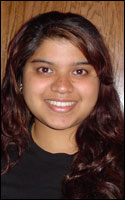School to Recognize 398 Graduates at Upcoming Commencement Ceremonies
Columbia, Mo. (May 8, 2006) — The Missouri School of Journalism will recognize its 398 May and August graduates at the upcoming commencement ceremonies that will begin at 4 p.m., Friday, May 12, in the Mizzou Arena.

The doctoral degree will be awarded to six students; 42 will receive the master’s degree.
Of the 350 undergraduate candidates, 120 studied advertising; 79, magazine journalism; 69, radio-television journalism; 64, newspaper journalism; and 18, photojournalism. 154 graduating seniors, 44 percent, are receiving minors.
Overall 112 graduating seniors, or 32 percent of the class, will be recognized with Latin honors. These students have at least a 3.5 grade point average for their last 60 graded credit hours.
The top 10 percent of the School’s graduates will be inducted into Kappa Tau Alpha, a journalism honorary society founded at the Missouri School of Journalism in 1910 with the goal of uniting students of exceptional achievement from the nation’s leading schools of journalism and mass communication.
The alumnus speaker will be Adrian Holovaty, BJ ’01, editor of editorial innovations at washingtonpost.com. There, he practices journalism via computer programming, fusing his backgrounds in journalism and Web development. Previously, he was lead developer at World Online, a highly-renowned news Web operation in Lawrence, Kan. He also has his hands in several side projects, including ChicagoCrime.org, an innovative site displaying Chicago crime reports that won the 2005 Batten Award for Innovations in Journalism.
Holovaty was named the youngest of the “40 Under 40” by Crain’s Chicago Business in 2005, and his online journalism work has earned awards from Editor and Publisher and the Newspaper Association of America. When Holovaty was an MU student, his work at The Maneater’s Web site was recognized by the Student Society for News Design, the Missouri College Media Association and Associated Collegiate Press. He lives in Chicago with his wife Sara, a journalist-turned-law-student whom he met during a college journalism conference.


The Master of Ceremonies will be Sylvia Snowden who will graduate with a degree in radio-television journalism and a minor in sociology. From Chicago, she had held internships with KBIA, the University of Missouri’s National Public Radio member station, and with the Chicago Crusader Newspaper. Snowden created and served as executive producer and host of “Speak On It” on MUTV. Her campus activities include serving as the 2005-06 president of the National Association of Black Journalists-Ale Chapter, the public relations chair of Alpha Kappa Alpha Sorority, Inc., and the 2004 political chair of the Legion of Black Collegians. Snowden has been active in the MU Women’s Center’s production of the Vagina Monologues, the National Panhellenic Council and Residence Life’s floor government.
The student speaker will be Millie Munshi, a dual major in newspaper journalism and economics. From Skokie, Ill., she has worked as a peer adviser for the Journalism and Mass Communication learning community in Cramer Hall as well as a Journalism Ambassador for the Journalism School. Munshi served as a student coordinator for the Freshman Interest Group (FIG) program during her senior year. She has been involved in a variety of other student organizations including The Maneater and the Interactive Theatre troupe. In the summer of 2005, Munshi was selected to be a Dow Jones Business Reporting Intern, for which she worked at the business desk at the Associated Press’ New York offices. After graduation, she will be working as an economics reporting intern for Bloomberg News in Washington, D.C.
Further information about the commencement ceremonies is available from the MU Commencement Web site.
Student Speaker
Millie Munshi, BJ ’06
May 12, 2006
Writing this speech was a lot harder than I thought it would be.
I had a few thousand ideas bouncing around my head, but it was hard to find a focus. It’s a bit of a weighty task – summing up the entire college experience in a few hundred words. So, I sought out the advice of some of my classmates and asked them: “What would you like in a graduation speech?”
Not surprisingly, the most frequent answer I got was “Keep it short.” There were also a number of votes for making fun of professors. But I thought (after talking about the marine-style experience you get with Greeley Kyle and Jen Moeller‘s unnatural obsession with dangling modifiers) there wouldn’t be very far to go. Someone else told me to combine history’s famous speeches and start off along the lines of “Four score and seven years ago, I had a dream.” But, something I learned about ethics in J-200 made me think that was a bad idea. Moreover, the lawsuits that Sandy Davidson taught me about in Comm Law made think it was a really bad idea.
So I kept asking more people, as any good journalist would. And then I got an answer that struck a chord; a friend told me “Please, just don’t say ‘I can’t believe we’re here today.'” And immediately, I knew why: This has been a long time coming. Anyone who has spent more than eight hours in the advertising lab trying to lessen their ad’s pixilation or who has pulled a 12-hour shift at KOMU knows this has been a long time coming. And any of you in the audience who are wondering if I’ve AC’d and CQ’d this speech – which I have – you also know that this has been a long time coming.
It’s been said that a life without passion is no life at all. I would argue that few people know this better than the students graduating today. Because it’s passion, and hopefully not insanity, that drew us to the Missouri School of Journalism, that kept us here and is what has enabled us to walk across the stage today. Without a real passion for communicating, for educating, for empowering, for informing – for journalism – none of us could have made it here. And all those hours cooped up in Lee Hills Hall would have been in vain.
I have learned so much from the people graduating with me today – from my classmates, peers and colleagues. And I have been truly inspired by their passion for the field. Whether it was through a 2 a.m. conversation about the Danish cartoon fiasco, seeing my peers be among some of the first to go down to report in hurricane-affected areas after Katrina or just listening to some of the banter at the Missourian’s copydesk, I’ve learned invaluable lessons from all of you. And I can only hope, I’ve done the same for you.
So as you embark on the next chapter in your life, please remember to never lose your drive, determination, commitment – your passion, because without it, you might just look like any other journalist, maybe even one who graduated from Kansas. And remember, there were a lot of people who helped bring us here today – family, friends, teachers, mentors, colleagues – they just like you, fully believe that you’ve made it here today. And they believe in you. Go out there and make them proud.
Text of Commencement Speech
Adrian Holovaty, BJ ’01
May 12, 2006
Thanks very much for the nice introduction, and thanks for having me. I’m deeply honored to be here with you today.
Well, 2006 grads, this is it. Congratulations. You’ve got the foundation.
You’ve got several years of hard-core journalism training. You’ve learned ethics. Reporting. Important legal issues. Hustle. Persistence. The importance of accuracy and fairness. All the journalism fundamentals. All the important stuff every journalist should never forget.
It’s really important to have that foundation. And, I’ve gotta say, you couldn’t have gotten the foundation from a better place. Since I graduated in December 2001, I’ve encountered several Missouri graduates in the industry and have consistently been impressed with their experience, integrity and dedication to quality journalism. You, and I, are in distinguished company.
The foundation that you got here is important because it will guide you for the rest of your journalism career. It’s important because, no matter what you do in this industry, it all comes back to that foundation. No matter how the industry changes, no matter how your jobs may change, it all comes back to the core journalism values you’ve learned here at Missouri.
But, most of all, the foundation is important because you need to understand the rules before you can break them. And now, more than ever, this industry needs to break some rules.
I’m not going to lie to you. This industry has seen better days. Newspaper circulation has been going down for decades. People’s trust in media is in the pits. The government is using an entire cable TV network for political gain. In a lot of ways, the media are failing.
Then there’s this whole Internet thing, which is clearly evil. Some guy in San Francisco runs a Web site, Craigslist, that lets anybody post a classified ad for free, completely bypassing the newspaper classifieds and, therefore, chipping away at one of newspapers’ most important sources of revenue. Why would I post a classified ad in a newspaper, which charges me money for a tiny ad in which I’m forced to use funky abbreviations just to fit within the word limit, when I can post a free ad to Craigslist, with no space limitation and the ability to post photos, maps and links? Google lets anybody place an ad on search results. Why would I, the consumer, place an ad on TV, radio or in a newspaper, if I can do the same on Google for less money and arguably more reach?
And, of course, the Internet affects those of us on the content side, too. There’s this blogging thing. According to the most recent State of the Blogosphere report from Technorati (an organization that tracks these sorts of things), 75,000 new weblogs are created every day, and 1.2 million blog entries are posted every day. Granted, a lot of those are drivel – “Today, I ate a ham sandwich” – but enough of them are substantial enough to have some editors worried there won’t be a “need” for journalism in a couple of years.
Now, I bring all of this up not to rain on the parade of graduation, but to offer the plain truth as a friendly kick in the pants as you walk out the door.
Graduates, the fire should be burning under each and every one of you. You should be yearning – aching – to bring this industry into a new age. Your generation – our generation – is going to be the one to do it.
You’re going to be the people breaking the rules. You’re going to be the people inventing new ones. You’ll be the person who says, “Hey, let’s try this new way of getting our journalism out to the public.” You’ll be the PR person who says, “Let’s try this new way of public relations that takes advantage of the Internet.” You’ll be the photographer who says, “Wow, quite a few amateur photographers are posting their photos online. Let’s try to incorporate that into our journalism somehow.”
You’ll be the person who asks, “Why are we doing things the way they are?”, and when the top editor says, “Because that’s the way they’ve always been done,” you’ll openly question that. “Because we’ve always done it that way” doesn’t cut it. “Because we’ve always done it that way” is blatantly unacceptable, blatantly lazy, and you need to call that out.
The pressure’s on.
So think about how exciting that is. Rarely is an entire industry in a position such that it needs to completely reinvent itself.
That’s what keeps me going, personally: The challenge of coming up with the best ways of presenting news and information in this new world where the products the industry has been producing for the past several decades are no longer in as much demand. The challenge of writing the rules, coming up with best practices. That challenge is monumental – but, man, it’s fun.
For instance, just about a year ago I launched a side project, ChicagoCrime.org. It’s a Web site that lets you explore every crime reported in the city of Chicago – almost a thousand per day. The site’s updated every day, and you can explore neighborhoods, you can see crime maps, you can get notified whenever a crime is reported on your city block. It’s a reinvention of the classic newspaper police blotter.
Then, late last year, I helped put together a project at the Washington Post called the U.S. Congress votes database. It lets anyone, anywhere, browse every vote in the U.S. House and Senate, going back to 1991, and it’s updated every day. You can see the full voting record for any senator or representative, and you can get notified whenever your representatives vote.
These projects were very exciting to build, because nothing like that had ever been done in the journalism world. It’s not the same old city-council newspaper story, whose format really hasn’t changed over the past, oh, 50 years. And I’m not trying to bash city-council stories…OK, maybe I am. They’re boring. But they’re part of that foundation I was talking about. Start thinking about what’s good about the foundation and what’s bad about the foundation. Start experimenting. Start reinventing.
So you might be thinking, “Hey, I’m fresh out of college, only 21 or 22 years old, how am I going to have any sort of influence?” “Who’s going to listen to me,” right?
Here’s the fun little secret. Editors are keenly interested in what young people have to say. I can’t tell you how many times I’ve been invited to meetings in which it was blatantly obvious the only reason I was there was to provide the token young-person opinion.
Just the other day this sort of thing happened with a coworker of mine at post.com. This guy I work with is around 22 years old, and one day he happened to mention to his immediate coworkers that he has a Facebook account. Immediately the coworkers, who were in their 30s and 40s, were saying, “You have a Facebook account? You have a Facebook account?! We’ve heard so much about that. Lemme see, lemme see!” So he showed them, not thinking it was a big deal. But those older coworkers, not having been in college the past couple of years, were fascinated.
(Actually, Facebook was a bit before my time, too, so if anybody here has an account and is willing to show me, please come see me after the ceremony.)
You have a distinct perspective, so people are going to be interested in what you have to say. Take that opportunity and exploit it.
I encourage all of you to be opinionated – not in your news coverage, but within the companies you work for. If something doesn’t make sense to you, speak up. If people are doing things strangely or inefficiently due to decades of doing the same thing, call them on it. If you have an idea that you know in your heart is fantastic, make it known, and make it happen.
It might be hard at first, but, hey, eventually things change. You need to push for that change. You need to innovate.
And if you get frustrated at work, do projects in your spare time. Start your own thing. The Chicago crime site I told you about was just a side project for me; I did it because it was exciting to do something that hadn’t been done before. I know of two journalists in Chicago who both quit their jobs in professional media and have started doing independent journalism on the Web. And I know of more than a dozen journalists who keep blogs in which they write about the industry – what were good ideas, what were bad ideas, what the industry needs to do next.
The industry presses on. And you are the generation who will press it.
I extend my deepest congratulations to all of you and look forward to seeing what you come up with. Thanks again for having me, and congratulations.
Updated: April 28, 2020